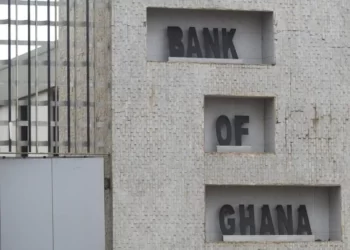A report by Dr. Richmond Atuahene and K B Frimpong, indicated that the Domestic Debt Restructuring in Ghana will cause the country’s 23 banks to experience substantial losses due to a reduced coupon rate and an extension of the maturity period from five to 15 years.
The report outlined that the banks will collectively lose an additional GH¢6.1 billion due to these changes, this is after an initial loss of GH¢10bn in liquidity in 2022 alone.
Prior to the implementation of the Domestic Debt Exchange Programme (DDEP), the 23 banks would have generated a positive cash flow of approximately ¢10.1 billion over the period, based on the original coupon rate of 19.3% per annum.
However, the report noted that the extension of the maturity period and the reduction of the coupon rate will impact heavily on their earnings from investments in Government of Ghana Bonds, resulting in a liquidity gap of approximately 10.3%. The report added that if the average customer deposit rate was around 10% per annum, but later declined to a weighted average rate of 9% per annum, this liquidity gap is expected to worsen.
“For instance, Bank A with a bond value of ¢9,106,452,000 and an average coupon rate of 19.3% would have had cash flow of ¢1,821,290,000, but with the Domestic Debt Exchange Programme, the effective rate of 9% per annum will cause a drop in cash flow to ¢720,927,000, thus leading to liquidity gap of ¢1,100,363,000.”
Report
An earlier report suggests that banks will lose a total of about ¢41.3 billion from the DDEP between 2023 and 2028. The losses can be computed by analysing the Net Present Value of the 23 local banks, and it is projected that the losses could amount to ¢41.315 billion.
This revelation has highlighted the need for the immediate establishment and operationalisation of the Financial Stability Support Fund of ¢15 billion to mitigate and address the expected liquidity challenges for some of the 23 banks that signed onto the Domestic Debt Exchange Programme. It is important to note that the successful implementation of the financial stability fund is critical to the survival of the affected banks.
Furthermore, the report urges the Bank of Ghana to implement the Basel III regulatory framework, which represents a huge step forward in the international regulation of banks. By imposing new liquidity requirements at the micro-prudential level, the framework seeks to reduce excessive maturity mismatches and ensure that banks hold enough liquid assets to survive during a short stress period.
The Domestic Debt Exchange Programme’s impact on Ghana’s 23 banks is a cause for concern, with projected losses amounting to billions of Ghanaian cedis. The establishment and operationalisation of the Financial Stability Support Fund of GH¢15 billion, coupled with the full implementation of the Basel III regulatory framework, are necessary steps to ensure the survival of these banks during these challenging times.
Background of the DDEP
Ghana has been in a critical situation with regard to its public debt as the country’s debt to Gross Domestic Product (GDP) has exceeded the dreadful limit of 100% recently after the joint Debt Sustainability Analysis by the Government/IMF and World Bank.
It Is the world’s second- most severely indebted developing country after Sri Lanka. Weak fiscal, higher inflation and persistent Cedi depreciation over extended periods of time led to an unsustainable fiscal situation for Ghana in 2022.
The high level of debt and the related interest rate payments were the major problems that Ghana has been facing. The country has been hit by a massive economic downturn characterised by high interest rates, soaring inflation of about 53.2% in January, 2023, record breaking cedi depreciation and multiple credit downgrades of the economy by international rating agencies.
Ghana has consistently recorded high fiscal deficits which have contributed to the current heavy debt burden and possibly default on its debt. The high deficit has been largely attributed to unproductive borrowing with high interest payments resulting from high borrowing requirements and the sensitivity of the debt portfolio to interest rate and exchange rate shocks. These were exacerbated by revenue inflows that continued to fall short of targets, a reflection of the weak economic environment and an economy vulnerable to external economic shocks.
Furthermore, the expansionary fiscal policy has resulted in a crowding out effect in the domestic lending market. Given the government’s appetite for debt and investors uncertainty, the Government was forced to issue high cost medium to long-term debt. This led to an increase in the stock of debt since 2016.
In that, as a consequence the country debt stock reflected greater liquidity and refinancing risk. Notably, the level of interest rate during the March 2022 quarter would have been informed by the weakened growth in the domestic economy and increased government demand for financing.
Ghana has become the latest among several smaller emerging markets from Sri Lanka to Zambia to buckle under its debt burden as the economic fallout from Covid-19 pandemic and Russia and Ukraine war fueled by high inflation and rising borrowing costs around the globe. Ghana’s government debt reached ¢575 billion (US$47 billion) at the end of November,2022, while public debt stood at 105% of its Gross Domestic Product.
High debt – and debt service – levels coupled with limited access to external finance has meant that the government had a little fiscal space with which to increase expenditures in public investment and poverty reduction programs.





















